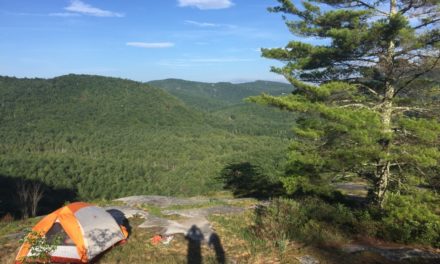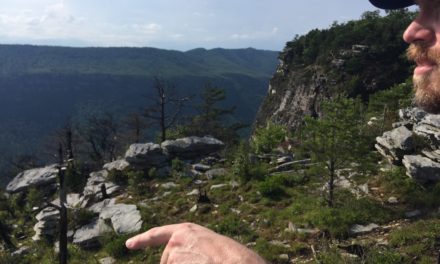The creek is bloated and swollen this morning. After the gluttonous revelries of food and fireworks found their way to bed, a storm blew in through the night, layering a blanket of thick moisture on the earth. With the exception of one Hank Hill who fights his wet lawn this morning, the neighborhood sleeps. I rise late and take Juno on a promised run.
All is quiet in the morning mist. I’ve promised myself to take it slow this morning, on a two-week break to rest from the last race, I’m trying to ease back into training for another one in a month, and I want to hear my breath and feel my body as it eases back into this routine. No rushing. No racing. Just a slow, steady pace to feel the joints and muscles move. The morning is perfect. The world is asleep after shooting stars into the night. Except for on couple and their dog, who I meet at a tree broken in last night’s storm, the greenway is mine.
Near the ¾ mark, I catch a glimpse of the creek down to my right. It is thick as a peanut butter pudding, barely moving if at all, filled with the overflow of the rain, a ponderous puddle in what had been a nearly dry bed as recently as a few days ago. It weighs on me—this water—in the creek bed, on the grass, on my skin, in the air.
Taoism relies heavily on water as a metaphor, and the command “Be like water” is one I remember hitting me with such ponderous weight when I was a carefree 20 year old first picking up these dusty tomes of Chinese philosophy. All of the sudden, being near water was never the same, and in each of my many camping and kayaking and rafting experiences, at some point, a pondering of that metaphor and all the meaning it entailed—to be as water—came full force.https://www.youtube.com/watch?v=pGFf3SRP1bE
It’s not that weird, after all. Our species has been seeing meaning for ourselves in the natural world since we first developed language. Even in the New Testament, Jesus asks his disciples to “consider the lilies” as a way to contemplate their impermanence and the vanity of clinging to worldly needs. In this story, Jesus tells his disciples exactly what the metaphor means.
For water, the metaphor is so complex, a web of conceptual meanings in which we compare ourselves to water without any guidance of which path is the correct. It is impermanent. It is always changing, as Heraclitus’ famous line “You never step in the same river twice” elucidates. It moves to the lowest point. It is flexible yet powerful. Both the easiest substance to break yet the most powerful in motion, it is both weak and strong.
It is easy to get wrapped up observing water as a spiritual experience, and for anyone with a transcendental streak knows, any time in nature can prove the same point. But even this spiritualization of nature has its limits. I was recently listening to a lecture by the late Alan Watts who talked of this in the Buddhist tradition. There, the strike of lightning is often metaphor for existence: Here and gone in a flash. Like pondering water or mountains or trees, pondering lightening in this way allows us to understand something deeper about the nature of our lives. But Watts claims that monks on the path to enlightenment would only reach it when they could once again see lightening and see it only as lightning, not the metaphor their spiritual teaching had built on top of it. While the natural world can be instructive in teaching these spiritual insights, seeing them only as symbols for the insights keeps us from seeing things as they are.
I had been thinking about Watts’ lecture a lot in the last couple of weeks, this idea that the epiphany of lightening (or water) simply rolls into the self, is not forgotten, but is not the only thing we see when we see the world. If we only see the metaphor, the spiritual message we seek actually hinders us from seeing the world as it is.
In the case of water, whether I remember the metaphor, or whether running beside a swollen creek reminds me to try to embody this, I am like water. We all are, whether we want to be or not. Physically, we are biologically composed of water to a great extent, giving ourselves many of the same physical properties. Metaphysically, we are all ever-changing, never the same river twice. The trick in Taoism, it seems, is that you…as a part of the natural world…are always in a larger harmony with the world, whether you are aware of it or not. Water simply moves where it needs to go. Being aware of it may make the harmony more useful or pleasant, but often storms come and fill the creek and the water will move more slowly than at other times.
But even here, I am looking in the water and only seeing my own reflection, a reflection easily distorted by a pebble tossed, a gust of wind, or the jump of a fish. In that, I am still not seeing the water, but only myself in it. This, too, is instructive. At brief points I see the water. At others, I see my own reflection, distorted by light and movement, or even here by the lapse of time and memory an hour after the run is complete. Struggling to see or remember the water would be just as fool hardy as wrestling the lighting for meaning. That water is gone, down the stream far from where it was when I observed it.
All of the sudden, I find myself very, very thirsty.


Recent Comments